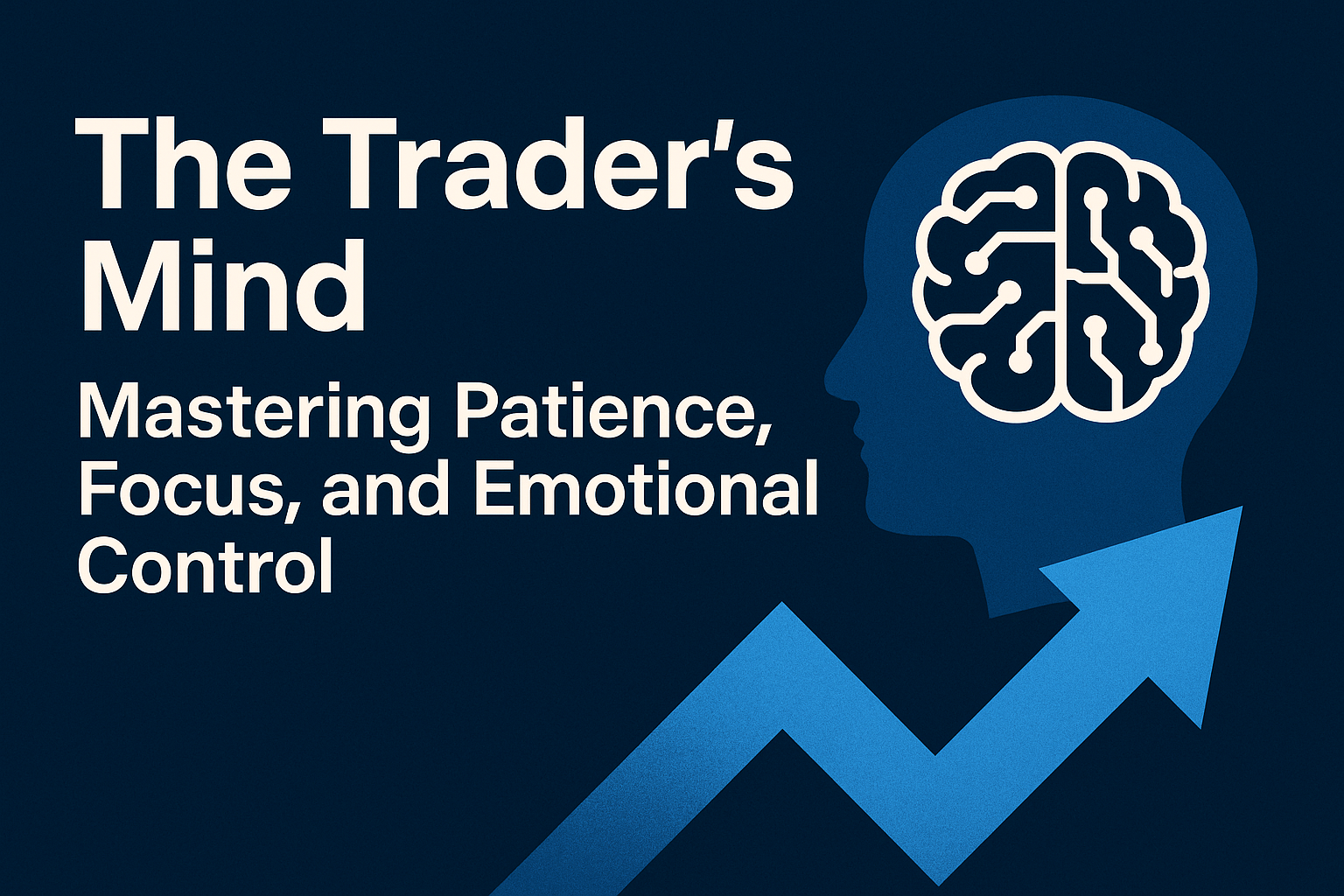Trader’s Mind trading is more than just reading charts or using tools. While these things are important, how you think and feel plays a big role in your success. Trading is really a mental game as much as a technical one.
The market can change quickly and without warning. Prices go up and down, and news can shake things up fast. This can make you feel stressed or rushed. Many traders make mistakes because they act too fast or let their emotions take over.
That’s why having the right mindset is very important. Patience, focus, and controlling your emotions are the three main skills every trader needs. These help you stay calm, make smart choices, and follow your plan no matter what happens in the market.
Patience means waiting for the right time to trade and not jumping in just because you are afraid to miss out. It’s about trusting your strategy and knowing good chances will come.
Focus means paying full attention to your trading and not getting distracted. With so much going on online and around us, it’s easy to lose focus. Good traders create a quiet space and clear goals to help them trade better.
Emotional control means managing feelings like fear, greed, or frustration. When you keep your emotions in check, you follow your rules, avoid overtrading, and handle losing streaks without panic.
Trading Is as Much a Mental Game as a Technical One
Trading isn’t just about reading charts, indicators, or using strategies. Those things are important, but without the right mindset, they don’t mean much. The market is always changing and unpredictable. Every trader faces times of doubt, losses, and uncertainty.
What makes some traders successful over time is their ability to master patience, keep focus, and control their emotions. At STRATEGIC, we believe mindset is not just a soft skill—it’s the foundation that decides if your trading plan will succeed or fail.
1. Why Mindset Shapes Trading Results
Technical tools can tell you when to buy or sell, but your mindset decides if you actually follow your plan.
A trader might see the perfect chance but close the trade too early because they are impatient. Or after losing a few trades, frustration might make them break their rules.
Common mindset mistakes include:
-
Impatience: Jumping in or out too soon.
-
Loss Aversion: Not accepting small losses and hoping things will get better, which leads to bigger losses.
-
Revenge Trading: Trying to get back lost money quickly, often causing more loss.
These habits don’t just lose money—they destroy confidence too.
2. Patience The First Key to a Strong Trader’s Mind
Patience isn’t just waiting—it’s smart discipline.
In trading, it means waiting for your exact setup before you enter, even if the market tempts you with “almost good” trades.
How to build patience:
-
Know Your Setups: Define clear rules for when to enter a trade.
-
Limit Trading Time: Don’t watch the market all day. Focus on quality, not quantity.
-
Trust Your Strategy: Backtest your plan so you’re confident waiting for the right trades.
Patience also means accepting losing streaks because every system has them.
3. Focus The Trader’s Lens
In today’s world, distractions are everywhere. But trading needs full attention.
How to stay focused:
-
Create a Quiet Space: Trade where you won’t be disturbed.
-
Set Goals: Decide what you want to do each session, like making one good trade or analyzing the market for an hour.
-
Block Distractions: Turn off social media, news, and unrelated tasks while trading.
Good focus helps you make smart, calm decisions instead of reacting to every price move.
4. Emotional Control Your Stability Anchor
The market will test your feelings every day—greed when winning, fear when losing, frustration when stuck.
Ways to control emotions:
-
Fix Your Risk: Limit how much you lose on each trade.
-
Keep a Trading Journal: Write down what you feel and learn from it.
-
Take Breaks: Use breathing or mindfulness to reset between trades.
-
Step Away: If emotions get too strong, pause trading for a while.
5. STRATEGIC’s Mindset Framework
At STRATEGIC, we train mindset like a skill, just like trading techniques. We track:
-
Patience: How often you follow your plan.
-
Focus: How many hours you trade without distractions.
-
Emotional Stability: How many trades you make based on feelings.
By measuring these, traders can improve their mindset step by step.
6. How AI Helps Your Mindset
AI tools can watch your trading habits. They spot when you trade too much, take risky trades, or leave trades too soon. With AI alerts, STRATEGIC helps you stick to your rules, even when emotions rise.
7. Exercises to Strengthen Your Trader’s Mind
Try these to improve mental strength:
-
Wait Before Trading: Pause one minute before making a trade to be sure it fits your plan.
-
Focus on One Market: Trade only one market for a month to build focus.
-
Mindful Review: After trading, write down how you felt and why.
8. Signs You Have a Strong Trader’s Mind
You know your mindset is strong when:
-
You can watch trades without checking constantly.
-
Losing streaks don’t make you panic or overtrade.
-
You follow your plan without hesitation.
You can take breaks without worry.
FAQs
1. Why is mindset important in trading?
Mindset helps you stay calm and make smart choices. Without the right mindset, emotions like fear and impatience can lead to mistakes.
2. How does patience help in trading?
Patience means waiting for the right trading setup instead of rushing. It helps you avoid bad trades and improves your chances of success.
3. What are common mindset mistakes traders make?
Common mistakes include impatience, avoiding stop-losses, and revenge trading (trying to quickly win back losses).
4. How can I improve my focus while trading?
Create a quiet trading space, set clear goals, and block distractions like social media or news during trading hours.
5. What is emotional control in trading?
It means managing feelings like fear and greed so they don’t affect your decisions. It helps you stick to your plan and avoid risky moves.
6. How can I practice emotional control?
Use tools like trading journals to track your feelings, take breaks when stressed, and follow strict risk limits.
7. Can mindset be learned or improved?
Yes! Mindset is a skill you can train with practice, routines, and by learning from your trades.
8. Why do some traders fail despite good strategies?
Often it’s because they don’t manage their emotions or lack patience and focus, causing them to break their own rules.
9. How long does it take to build a strong trader’s mind?
It varies, but with consistent practice and habits, many traders see improvement in a few months.
10. Can technology help improve mindset?
Yes, tools like AI can track your trading habits and alert you when emotions or distractions affect your decisions.
Conclusion
The market rewards those who trade with discipline, not emotion.
Mastering patience, focus, and emotional control gives you the mental strength for steady success.
At STRATEGIC, we remind traders: charts don’t make decisions—you do. And the quality of those decisions depends on the state of your mind.
want to read more about trading click here
Big Shoutout to the guys who made this blog happen UDM.




